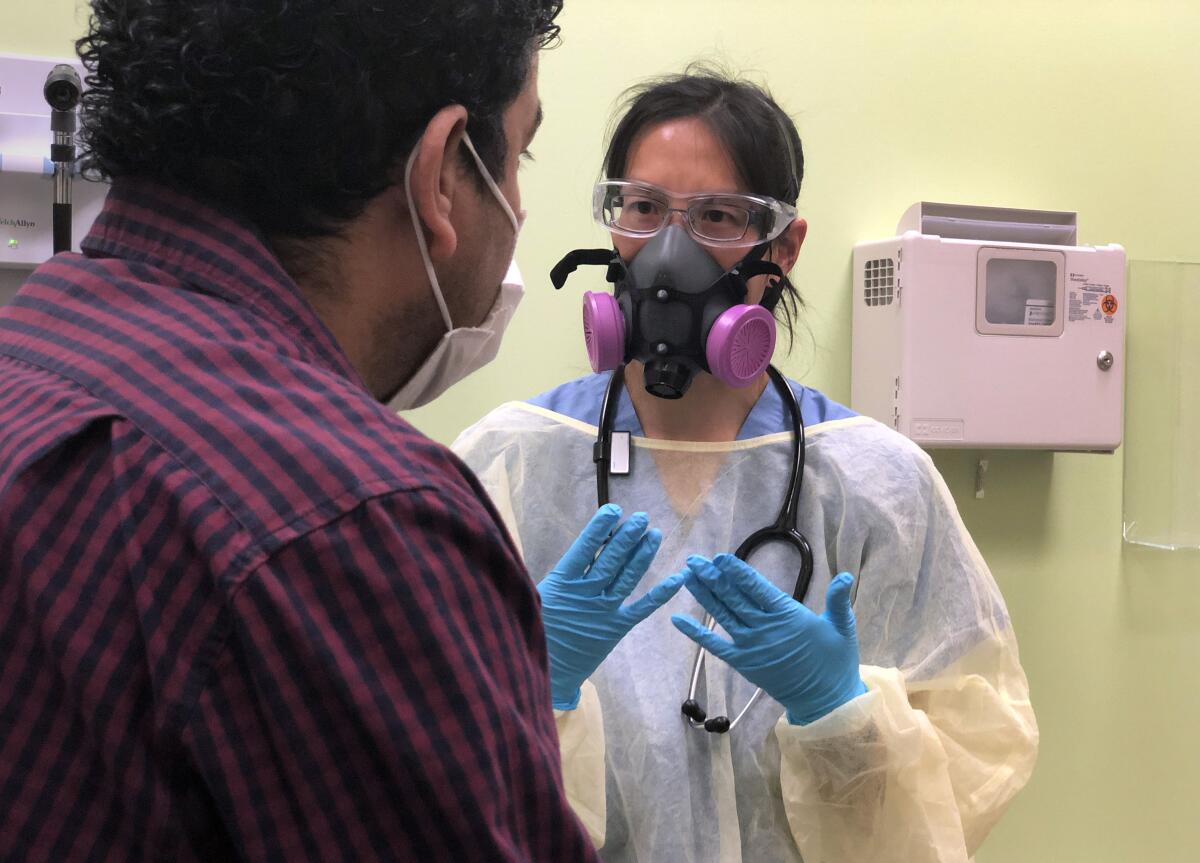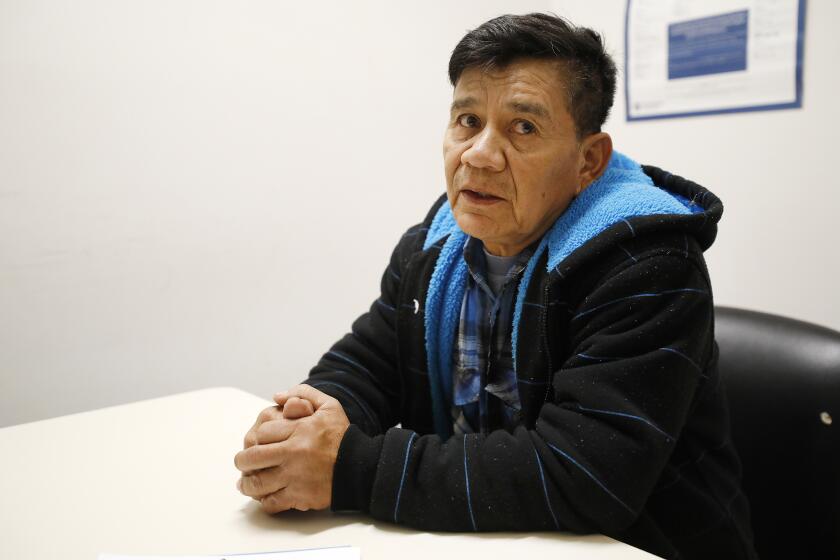Appeals court tosses order aimed at protecting immigration detainees from COVID-19

- Share via
SAN FRANCISCO — A federal appeals court decided 2 to 1 Wednesday to overturn a nationwide order requiring federal immigration authorities to monitor and possibly release detainees at high risk of dying or suffering long-term complications from COVID-19.
A three-judge panel of the U.S. 9th Circuit Court of Appeals said a Riverside-based federal district judge overreached when he issued a preliminary injunction in April 2020 requiring the government to identify and track immigration detainees with certain health risks and establish directives for release during the pandemic.
“That the plaintiffs and district court may have desired more detainees be released, and on a potentially quicker basis, does not mean that the government’s approach — which involved early release determinations — reflected reckless disregard on a national basis,” wrote Judge Daniel A. Bress, a Trump appointee. He was joined by Judge Eric D. Miller, whom Trump also appointed.
U.S. District Judge Jesus D. Bernal issued the injunction at a time when a growing number of immigration detainees across the nation were contracting the coronavirus in crowded facilities. Lawyers were trying to free as many clients as possible based on constitutional and humanitarian arguments.
In court filings, Immigration and Customs Enforcement argued that concern about detainees contracting the virus amounted to “mere speculation” and that releasing large numbers would set a precedent that would persist even after the virus subsided.
The Trump administration appealed the injunction but did not seek an immediate stay to block it. The Biden administration and lawyers for the immigrants asked to be able to mediate their differences in September, but the 9th Circuit majority refused, saying the request came too late.
The Civil Rights Education and Enforcement Center, a nonprofit group that advocates for immigration detainees, tweeted that it was “heartbroken and infuriated” by the decision. The injunction led to the release of thousands of medically vulnerable detainees, the group said. Addressing the Biden administration, the group said, “This is on you,” for not dropping the appeal.
In court filings, ICE has argued that concern about detainees contracting coronavirus is “based on mere speculation” and that releasing large numbers of them would set a precedent that would persist even after the virus subsides. But ICE is instructing field offices to assess and consider for release those who were deemed to be at greater risk of exposure.
Elizabeth Jordan, a lawyer with the center, said it was considering its options, which include appealing to a larger panel of the 9th Circuit. The case is not moot, even though vaccines are now available, she said. An immigrant died of COVID-19 in detention as recently as Oct. 1, she said, and many immigrants, perhaps distrustful of ICE, have refused the vaccines.
“We think the pandemic is very much an ongoing issue, putting people’s lives at risk,” she said, declining to elaborate on the group’s tweet about the Biden administration.
The 9th Circuit decision scrapped the injunction and ordered that all policies based on it be rescinded. The panel said the injunction failed to recognize that ICE already had devised pandemic policies and released many high-risk detainees before April of last year.
“COVID-19 presents inherent challenges in institutional settings, and it has without question imposed greater risks on persons in custody,” Bress wrote. “But plaintiffs had to demonstrate considerably more than that to warrant the extraordinary, system-wide relief that they sought.”
The injunction, the majority said, “effectively placed a federal court at the center of the Executive’s nationwide effort safely to manage immigration detention facilities in the middle of an evolving pandemic.”
Judge Marsha S. Berzon, a Clinton appointee, dissented. She said that the pandemic policies in place at the time of the injunction amounted to recommendations, not requirements, and that the injunction gave plenty of discretion to the federal government.
At the time of the injunction, she said, the district court noted that ICE had no policy mandating acceptable detention conditions for medically fragile inmates and no enforcement mechanism.
One man, held at the Etowah County Detention Center in Alabama, said last spring that he ate three meals a day side by side with 70 other people, spent four hours each day in a group area with no room for distancing, shared a small cell with another detainee, and received only one mask to reuse and a bar of soap every one to two weeks, according to Berzon.
“Although one would not know this from reading the majority’s hyperbolic language … the April 2020 injunction ultimately required ICE to devise appropriate policies; the injunction did not dictate those policies or usurp the agencies’ role in running the detention facilities,” Berzon wrote.
The injunction also did not order inmates released and “did not create a nationwide policy,” she said. “It mandated only that ICE change its own nationwide policies.”
The preliminary injunction came in response to a lawsuit filed by immigrant rights advocates. Even before the pandemic, the lawsuit charged that the federal government was systematically denying healthcare to tens of thousands of detainees. The suit said ICE was confining inmates to their cells without access to wheelchairs or canes, refusing insulin to diabetics and keeping those suffering from post-traumatic stress disorder in isolation for months.
More to Read
Sign up for Essential California
The most important California stories and recommendations in your inbox every morning.
You may occasionally receive promotional content from the Los Angeles Times.















